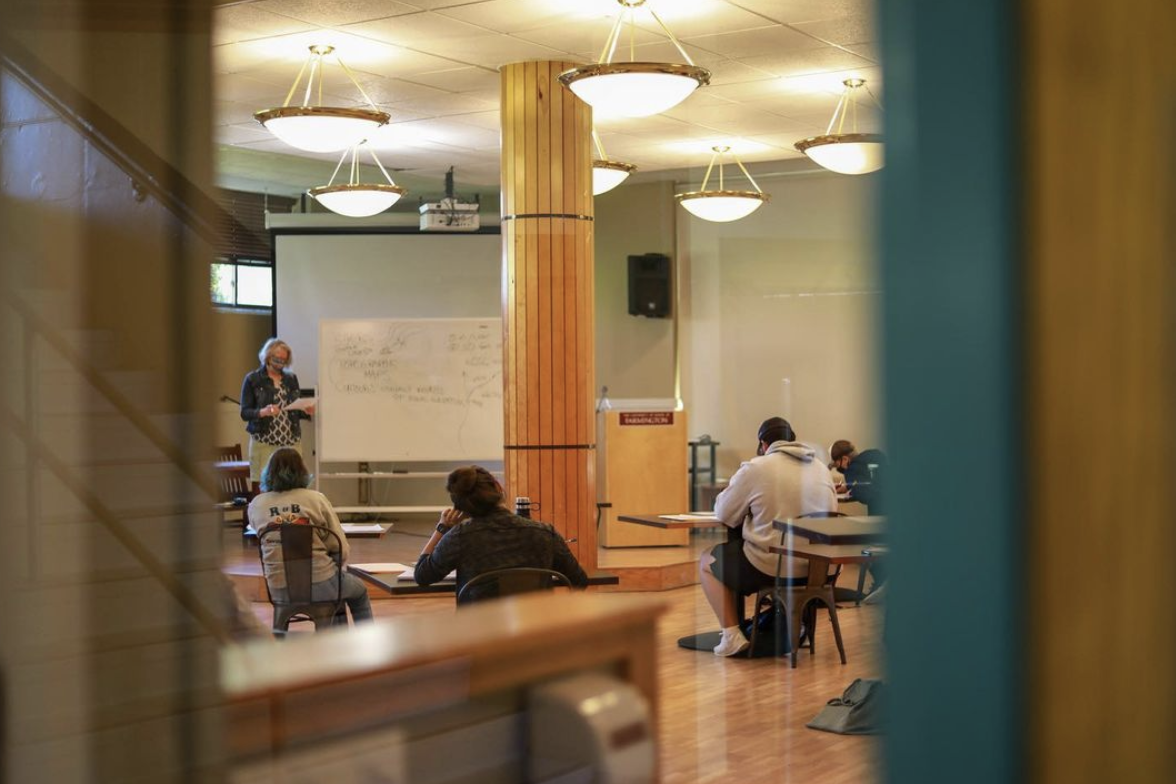
FARMINGTON – To examine higher education in a pandemic is to see it through a lens of immense adaptability, dedication and a firmly rooted passion to share knowledge even in times of uncertainty and stress. This fall semester at the University of Maine at Farmington, professors were given the option to design in-person, virtual or hybrid classes for students, and with the closing of the semester comes an evaluation of this new way of teaching that may be here for the long term.
Professor Kristen Case of the Humanities Department is teaching a senior seminar as well as an Environmental Literature class this semester, and according to her, nearly everything about this semester was different than other years in which she’d taught.
“The energy in the room is just different. It’s lower. I’ve had to realize that people are still learning even if they’re quieter, if it feels slower,” Case said.
In other programs, teaching in a pandemic has required a creative approach to navigating the mechanics of class procedures. The Biology major is known for boasting some of the largest class sizes on campus, hands-on labs and intensive demonstrations, but with social distancing precautions, the experience of Biology students this fall semester has looked quite different from years past.
“I use a hybrid approach. I teach my three hour labs in person, either outside or I divide the students into two adjacent teaching lab rooms with a small prep room in between. That means that I have to set up, and break down afterwards, my indoor labs in both rooms and move back and forth between them. It can be a little exhausting, but it actually works pretty well, although it must look comical as I bounce from one room to the other and sometimes talk to both rooms from the prep room,” Professor Andrew Barton said.
Barton is teaching the freshman biology course for majors in biology, environmental science, and secondary education-science at UMF. The class normally holds about 70 students and is a combination of lectures and labs. Barton has been holding lectures via Zoom but has felt there is no adequate replacement for the labs themselves.
“Labs are highly interactive, but my students have been great about wearing masks and keeping their distance from each other,” he said.
Professor across disciplines have also noticed that this semester has demanded a prioritization of humanity as well as retention.
“I want to create an atmosphere in which people don’t feel punished. We need to be more forgiving of one another and ourselves in this time. I try to make my students know that wherever they are today, that’s okay,” Case said.
She said she has placed more of an emphasis on self-care as well as academic success. She’s also been starting classes each day with 10 minutes of meditation to give the students a chance to decompress and assess where they are each day.
Barton has also noticed that he’s had to incorporate more empathetic and personal advisement into his teaching this semester.
“I’m spending much more time one-on-one with students, helping them stay on task and navigate the challenges of pandemic learning…I sensed at the beginning of the semester that advising needed to be a much bigger part of my teaching,” he said.
Though this semester has come with its challenges, for the professors it’s also reinforced the reputation of the student population at UMF as one of resilience and unique humility. Both Case and Barton spoke to this, perhaps unexpected, gratification they’ve felt this semester.
“I’m actually very happy with how things have gone this semester. I feel like I’m helping my students a little bit during a time when it matters a lot,” Barton said.
Though faculty could have taken more credit for the success of this first semester in an altered education system, working 60 hours a week and taxing their own time and energy to try and create an enthusiastic and positive learning environment, they were more inclined to attribute it to the students.
“I feel moved that we’ve been successful in getting to Thanksgiving. That’s the students. They make or break this, and I think it speaks to a moral responsibility they’ve upheld. I’ve always felt that UMF students value college. It means something to them and they’re willing to make sacrifices to preserve their chance to be here and work hard. It’s not like that everywhere,” Case said.




